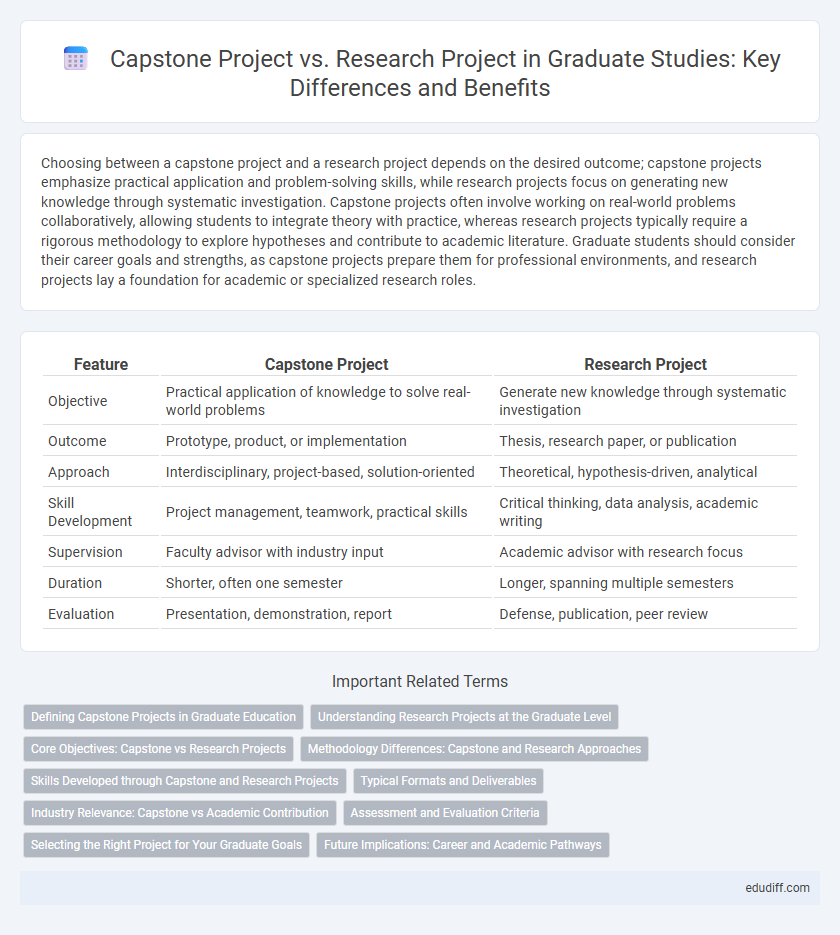Choosing between a capstone project and a research project depends on the desired outcome; capstone projects emphasize practical application and problem-solving skills, while research projects focus on generating new knowledge through systematic investigation. Capstone projects often involve working on real-world problems collaboratively, allowing students to integrate theory with practice, whereas research projects typically require a rigorous methodology to explore hypotheses and contribute to academic literature. Graduate students should consider their career goals and strengths, as capstone projects prepare them for professional environments, and research projects lay a foundation for academic or specialized research roles.
Table of Comparison
| Feature | Capstone Project | Research Project |
|---|---|---|
| Objective | Practical application of knowledge to solve real-world problems | Generate new knowledge through systematic investigation |
| Outcome | Prototype, product, or implementation | Thesis, research paper, or publication |
| Approach | Interdisciplinary, project-based, solution-oriented | Theoretical, hypothesis-driven, analytical |
| Skill Development | Project management, teamwork, practical skills | Critical thinking, data analysis, academic writing |
| Supervision | Faculty advisor with industry input | Academic advisor with research focus |
| Duration | Shorter, often one semester | Longer, spanning multiple semesters |
| Evaluation | Presentation, demonstration, report | Defense, publication, peer review |
Defining Capstone Projects in Graduate Education
Capstone projects in graduate education serve as integrative experiences where students apply theoretical knowledge to practical challenges, often culminating in a tangible product or presentation. Unlike traditional research projects that prioritize hypothesis testing and original inquiry, capstone projects emphasize problem-solving, interdisciplinary collaboration, and real-world application. These projects reinforce critical skills such as project management, communication, and analytical thinking essential for professional practice.
Understanding Research Projects at the Graduate Level
Graduate research projects emphasize original investigation, requiring thorough literature review, hypothesis formulation, and methodological rigor to contribute new knowledge to the field. Capstone projects integrate practical application of learned skills to solve real-world problems, often presenting a synthesis rather than groundbreaking research. Understanding the distinction clarifies expectations for scope, depth, and academic contribution in graduate-level work.
Core Objectives: Capstone vs Research Projects
Capstone projects emphasize the practical application of knowledge by tackling real-world problems, integrating interdisciplinary skills to demonstrate mastery within a specific field. Research projects prioritize generating new knowledge through systematic investigation, hypothesis testing, and contributing to academic literature. The core objective of capstone projects is synthesis and innovation in applied contexts, while research projects focus on advancing theoretical understanding and empirical evidence.
Methodology Differences: Capstone and Research Approaches
Capstone projects emphasize practical application, utilizing qualitative, quantitative, or mixed methods to solve real-world problems through case studies, surveys, or design processes. Research projects prioritize systematic investigation, often employing experimental, observational, or longitudinal methodologies to generate new knowledge or test hypotheses. Methodological rigor in research projects typically involves structured data collection and analysis frameworks, while capstone projects balance academic inquiry with hands-on implementation and stakeholder engagement.
Skills Developed through Capstone and Research Projects
Capstone projects develop practical skills in project management, teamwork, and real-world problem-solving, emphasizing the application of interdisciplinary knowledge. Research projects enhance analytical thinking, experimental design, and data interpretation, fostering critical evaluation and methodological rigor. Both experiences cultivate communication skills, but capstone projects often require client interaction, while research projects prioritize academic dissemination.
Typical Formats and Deliverables
Capstone projects typically culminate in a practical solution or product, often accompanied by a comprehensive report and presentation that demonstrate applied skills and real-world impact. Research projects prioritize the generation of new knowledge through a detailed thesis or dissertation, including literature reviews, methodology, data analysis, and scholarly discussion. Deliverables for capstone projects often include prototypes, design documents, or business plans, whereas research projects emphasize peer-reviewed articles and extensive written documentation.
Industry Relevance: Capstone vs Academic Contribution
Capstone projects emphasize practical application by solving real-world industry problems, aligning closely with employer expectations and enhancing graduate employability. Research projects prioritize advancing academic knowledge through rigorous investigation, contributing novel insights to a specific field. Industry relevance in capstone projects makes them ideal for students seeking direct career impact, whereas research projects benefit those pursuing scholarly excellence and theoretical development.
Assessment and Evaluation Criteria
Capstone projects are typically assessed based on practical application, problem-solving skills, and the ability to integrate knowledge from multiple disciplines, emphasizing real-world outcomes and deliverables. Research projects are evaluated primarily on methodological rigor, originality, data analysis, and contribution to academic knowledge, with a strong focus on hypothesis testing and literature review quality. Both assessments prioritize clarity of presentation, depth of critical thinking, and adherence to academic standards, but capstone projects often include stakeholder feedback as part of the evaluation criteria.
Selecting the Right Project for Your Graduate Goals
Choosing between a Capstone Project and a Research Project depends on aligning with your career objectives and academic strengths. Capstone Projects emphasize practical application and problem-solving skills ideal for professional pathways, while Research Projects focus on theoretical exploration and contribute to academic knowledge suited for those pursuing doctoral studies. Assessing your graduate goals and desired skill set ensures the selection of a project that maximizes your academic and professional outcomes.
Future Implications: Career and Academic Pathways
Capstone projects provide practical experience that enhances employability by demonstrating applied skills and problem-solving abilities valued by industry employers. Research projects develop critical thinking and specialized knowledge, laying a strong foundation for academic careers and advanced degrees such as PhDs. Choosing between the two influences career trajectories, with capstone projects aligning more with professional roles and research projects fostering opportunities in academia and scholarly research.
Capstone Project vs Research Project Infographic

 edudiff.com
edudiff.com